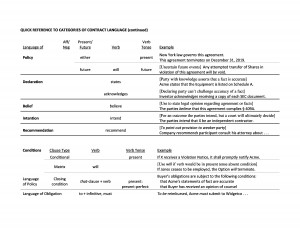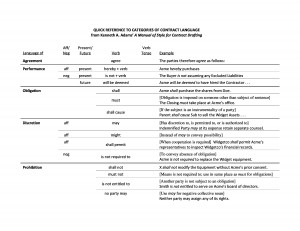Today I did a “Drafting Clearer Contracts” seminar for the Utah State Bar. As with last year’s seminar in Boise for the Idaho State Bar (see this blog post), it was sold out. And it appears that a worthwhile time was had by, if not all, then at least those with whom I spoke.
One of those in attendance was Mark J. Morrise, a trusts-and-estates lawyer with the Salt Lake City law firm Callister Nebeker & McCullough. Afterwards, Mark shared with me something that I think is pretty nifty—a two-page document entitled “Quick Reference to Categories of Contract Language.” Go here for the PDF; below are images of both pages.
I can’t comment on the details of Mark’s document, as I haven’t had time to look at it. But given the intricacies of MSCD‘s discussion of “categories of contract language,” and given that I think it’s the most important topic in the book, I like the idea of a quick reference.
I could imagine preparing an infographic-style quick reference. Let me know if you think that would be something worth doing.



Brilliant! I’d love to see an infographic-style quick reference.
I think it’s a great idea. Reminds me of the cheat sheet at the front of Butterick’s Typography for Lawyers, which after reading the book is the part I refer to most frequently.
Yes. Love cheatsheets, cheatlists, and infographs.
I echo the other comments. Am about to start work on a Contracts text for first year law students that aims to promote what I call “foundational transactional awareness”. Inspired by MCSD I’m contemplating an early cornerstone segment on categories of contract language that we’ll come back to again and again as the book unfolds. So a quick reference would be a godsend!
I think this is great. How does Mr. Morrise feel about its being widely shared?
When I asked Mark for a copy I told him I’d be putting it on the blog, so I can only assume that he feels just fine about it. And why wouldn’t he? It’s not as if he could derive some competitive advantage from keeping it private: the broader the notion of clearer contract language spreads, the better it is for everyone. And I don’t think I’m depriving him of an opportunity to sell it.
Many is the time I have wanted to say to the lawyer across the table, “you should get yourself a copy of [MSCD].” I’d send one myself, but (a) it’s too expensive and (b) it might not be taken, shall we say, in the proper spirit. Is there a non-threatening way, do you think, to provide a copy of the cheat sheet?
Tell the lawyer across the table, “I try to follow Adams’s recommendations, but the book’s so fat, I use a cheat sheet. Let me give you a copy so you’ll see what I’m aiming at.”
It’s a nice taxonomy, but I’d be curious to see whether it helps newbies, because I can’t see it being of much benefit to experienced, competent drafters.
Obviously, any reference work will be useful only to those who aren’t equipped with all the learning that it contains. It follows that some people might not need this sort of quick reference.
But in my experience, experienced and competent drafters who wouldn’t benefit from being exposed to, or becoming more familiar with, my “categories of contract language” framework are the exception. There are plenty of experienced drafters, but a large proportion aren’t very competent when it comes to the categories of contract language and other basic concepts.
I concur with Ken. Every so often, if the context is novel, I have to stop and think about what verb I should be using, so I quickly check the Manual; the cheat sheet just makes that easier.
Even musicians who know the tunes can benefit from a fake book to remember the chords.
Ken – that was without a doubt the most valuable CLE I have attended in my seven short years of practice. If every CLE could be half as useful, I would fulfill Utah’s CLE requirements with a positive attitude.
I was just about to make my own cheat sheet when I came across this post. Thank you to you and Mark.
Maybe for the 4th edition you could put something similar under each cover – like the Bluebook.
Thanks Ken, I heard at least 2 people tell me it was the best CLE they had ever attended.